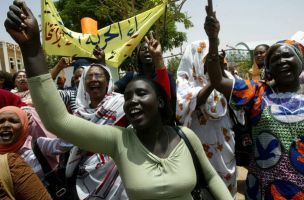Sudanese legislators pass elections law
July 7, 2008 (KHARTOUM) — Sudanese parliament passed today the longtime discussed elections bill, a step considered as crucial for the organization of general elections in the country after the end of the interim period in 2009.
 The National Elections Act of 2008 was approved by 350 votes and 14 opposed, while two legislators abstained. The total MPs who participated in the vote is 366.
The National Elections Act of 2008 was approved by 350 votes and 14 opposed, while two legislators abstained. The total MPs who participated in the vote is 366.
The law lays the basis to run the first fair elections in the country since the Islamist coup d’Etat of 1989 by adopting a mixed electoral system. 60 per cent of the 450 MPs will be chosen through the majority elect in their geographical constituencies. It also guarantees 25% of the parliamentary seats to women who will be elected through the proportional representation with other 15% of the MPs.
The new law organizes the holding of general elections in the country at three levels, including presidential election and elections for the federal parliament and regional legislative chambers, while voters in southern Sudan have also to elect the president of the government there.
The bill sets 4 percent minimum vote needed for any party to enter parliament through the proportional representation and requires for candidates at presidential elections to get at least 200 endorsements from 18 of Sudan’s 25 states.
The New law enfranchises all Sudanese citizens over the age of 18. Candidates for election must be over the age of 40 and have no criminal record.
Independent candidates need the signatures of at least 100 local supporters.
Elections will be held in the period from January to April 2009.
The 2005 Comprehensive Peace Agreement, signed by National Congress Party and the SPLM after two-decade civil war, calls for elections no later than 2009. Under the timetable of the accords, the electoral legislation should have been in place by January 2006, making the law two and a half years late.
Under the interim national constitution, set up after the 2005 peace agreement, all current MPs are appointed.
The two major innovation of this law are, the adoption of the partial proportional representation and the dedication of 25% of the parliamentary seats to women.
However, some opposition parties, as the National Democratic Alliance, did not support the law, criticizing several components that they claim hurt their chances at winning seats in future elections.
Also Sudanese women demonstrated today against using a separate list of women candidates for the election of 25 percent of the 448 parliamentary seats allocated for women. They would have preferred to have the women on the main party lists.
“We are not as different as women we are different as political parties,” Mariam al-Mahdi, from the opposition Umma Party told Reuters.
Complete democratic transformation in Sudan would also require major legal reform elsewhere, such as media and national security legislation.
“The press and media law, the national security law and even the criminal laws much be changed,” said Yasir Arman, the deputy secretary general of the SPLM and member of parliament. “We cannot have free and fair elections without having new laws”.
(ST)

Kideopo Boy
Sudanese legislators pass elections law
The press,media,security and criminal laws mush be changed; Yaser Araman said. What has gone wrong with our party the SPLM? Is history of the population censes repeating itself here also when religion and encinity was excluded by NCP and lastly excepted by the SPLM? It could have been better for the SPLM and other national Parties to resist this elections law before it is pass to mend the above mentioned laws instead of opposing after being already passed. Let us all wait for 2009 adventages and disadventages. May peace prevail in our beloved Sudan especially our Southern Sudan.
Kideopo Boy
Sudanese legislators pass elections law
Ladies and gentlemens let us all congraculate our women on their brave role in fighting injusties,inequality and Human Rights. These mothers and sisters action is highly appreciated. How can we men consider our partners (women) second class in all walks of live. This is unacceptable. Our paliarment could have answer the questions of the women protesting outside the compound before passing the elections law if democracy was to be there. Then if all women refused to go to the election centers (2009) to give their vote,who will be blame the government or women? Or they will be taken by force to vote??
martin simon wani
Sudanese legislators pass elections law
Brother Kideopo Boy
I think no one can reduce women in to second class citizens, remember there are women in the nationl assembly which passed the election law. How do you expect women to secure their 25% through election if seperate arrangement is not made? By the way if we really mean that men and women are equal, there should be no need for special percentage for women. Let us just go for election as equal partners and who ever win become a winer regardless of their sex. But the fact that they want special treatment is recognition of the fact that they are not equal with men.
The Wiseman
Sudanese legislators pass elections law
Glad to see all SPLM secretaries series against the NCP plot to fool SPLM in the comming elections. This is a wrong time for Southern Sudanese to be cheated for they have one of their eyes opened by CPA and what is left is seriousness and abillity.
Good Arman, maintain the spirit.
First reason!
Michel Fleury
Sudanese legislators pass elections law
In Europe and in America, there is no special list for the women. Result: in many countries, the women do not exceed 10 % in parliaments (5 % in France).